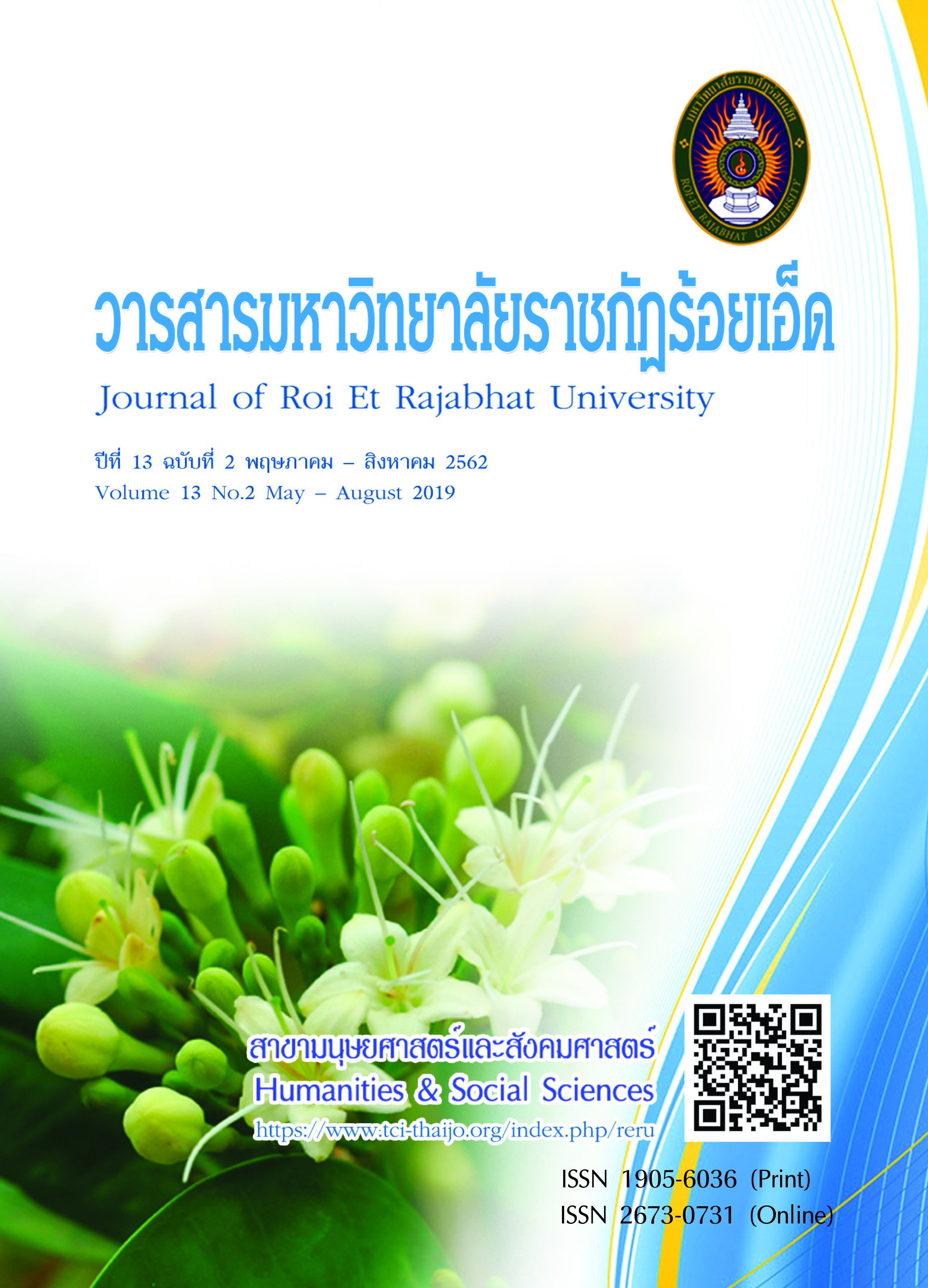The Development of a Program to Develop Teachers’ Learning Management Regarding Sufficiency Economy Integration in the Department of Social Studies, Religion and Culture for Schools under the Secondary Educational Service Area Office 25
Keywords:
Teacher Development Programs, Philosophy of Sufficiency Economy, Teacher Development MethodsAbstract
The purposes of this research aimed at: 1) studying the factors and the learning indicator of learning management integratedinto the Philosophy of Sufficiency Economy; 2) studying the current circumstance and the satisfactory characteristics to develop teachers’ learning management integrated into the Philosophy of Sufficiency Economy; and 3) developing the teacher development programs for learning management integrated into the Philosophy of Sufficiency Economy. The research was divided into three phases: the first phase was to study the factors; the second phase was to study the current circumstances and the satisfactory characteristics and the third phase was to develop the teachers’ program. The subjects were 212 administrators and teachers in the Department of Social Studies, Religion and Culture and they were sampled by the Simple Random Sampling. They all worked under the Secondary Educational Service 25. The tools used in the research were: the factor assessment, the indicators, the questionnaire of current circumstances and satisfactory characteristics including the suitability assessment and the possibility of the program. The statistical tools comprised Index of Item – Objective Congruence (IOC), frequency, percentage, standard deviation and hierarchy of needs. The research result found that: 1) there were five factors of learning management integrated into the Philosophy of Sufficiency Economy which included: 1) the setting of the objectives; 2) lesson planning; 3) the setting of the content; 4) teaching management; and 5) learning assessment 2) an overall picture of the current circumstances integrated into the Philosophy of Sufficiency Economy for overview image was at a high level and that of the satisfactory characteristics was at the highest level with three methods of teachers’ program as follows: 1) educational workshops; 2) additional educational training courses; and 3) mentoring. 3) an overall development of teachers’ program in learning management integrated into the Philosophy of Sufficiency Economy and suitability of program was at the highest level, and the possibility of program was at the highest level.
References
กระทรวงศึกษาธิการ. (2550). ยุทธศาสตร์การขับเคลื่อนปรัชญาเศรษฐกิจพอเพียงสู่สถานศึกษา (2551-2554). กรุงเทพฯ: ศูนย์ประสานงานกลางการดำเนินงานโครงการอันเนื่องมาจากพระราชดำริ.
กำธร ทาเวียง. (2553). การขับเคลื่อนปรัชญาเศรษฐกิจพอเพียงสู่สถานศึกษา สังกัดสำนักงานเขตพื้นที่การศึกษาประถมศึกษานครปฐม เขต 2. การค้นคว้าอิสระ ศึกษาศาสตรมหาบัณฑิต สาขาวิชาการบริหารการศึกษา. กรุงเทพฯ: มหาวิทยาลัยศิลปากร.
เชษฐา ค้าคล่อง. (2557). การพัฒนาโปรแกรมเสริมสร้างภาวะผู้นำแบบมุ่งบริการของผู้บริหารสถานศึกษาขั้นพื้นฐาน. ดุษฎีนิพนธ์ การศึกษาดุษฎีบัณฑิต สาขาวิชาการบริหารและพัฒนาการศึกษา. มหาสารคาม: มหาวิทยาลัยมหาสารคาม.
บุญชม ศรีสะอาด. (2544). การวิจัยเบื้องต้น. กรุงเทพฯ: สุวีริยาสาส์น.
ประวิต เอราวรรณ์. (2545). การวิจัยปฏิบัติการ. กรุงเทพฯ: บริษัท สำนักพิมพ์ดอกหญ้าวิชาการ จำกัด.
เพ็ญนภา ธีรทองดี. (2552). การนำหลักปรัชญาของเศรษฐกิจพอเพียงไปใช้ในการบริหารจัดการของสถานศึกษา สังกัดสำนักงานเขตพื้นที่การศึกษาราชบุรี เขต 2. วิทยานิพนธ์ ครุศาสตรมหาบัณฑิต สาขาวิชาการบริหารการศึกษา. ราชบุรี: มหาวิทยาลัยราชภัฏหมู่บ้านจอมบึง.
ยอดอนงค์ จอมหงส์พิพัฒน์. (2553). การพัฒนาโปรแกรมพัฒนาครูผู้นำการจัดการเรียนรู้ตามแนวทางการปฏิรูปการศึกษาขั้นพื้นฐาน. ดุษฎีนิพนธ์ ครุศาสตรดุษฎีบัณฑิต สาขาวิชาภาวะผู้นำทางการบริหาร. สกลนคร: มหาวิทยาลัยราชภัฎสกลนคร.
วีระชัย ศรีวงษ์รัตน์. (2559). แนวทางการพัฒนาสมรรถนะครูด้านการจัดการเรียนรู้ในสถานศึกษา สังกัดสำนักงานเขตพื้นที่การศึกษาประถมศึกษาอุดรธานี เขต 1. วิทยานิพนธ์ การศึกษามหาบัณฑิต สาขาวิชาบริหารการศึกษา. มหาสารคาม: มหาวิทยาลัยมหาสารคาม.
ศักดิ์ดา คำโส. (2557). การพัฒนาโปรแกรมการเสริมสร้างพลังอำนาจทีมงานในสถานศึกษาขั้นพื้นฐาน. ดุษฎีนิพนธ์ ศึกษาศาสตรดุษฎีบัณฑิต สาขาวิชาบริหารการศึกษา. มหาสารคาม: มหาวิทยาลัยมหาสารคาม.
สำนักงานเลขาธิการสภาการศึกษา. (2556). บทวิเคราะห์สถานภาพการพัฒนาครูทั้งระบบและข้อเสนอแนะแนวทางการพัฒนาครูเพื่อคุณภาพผู้เรียน. กรุงเทพฯ: บริษัทพริกหวานกราฟฟริคจำกัด.
อัญชลี สารรัตนะ. (2542). เรียนรู้สู่ครูมืออาชีพ การศึกษาแบบบูรณาการ (พิมพ์ครั้งที่ 4). กรุงเทพฯ: ทีพีพริ้น.
มณีรัตน์ ศุภานุสนธิ์. (2560). การสอนสังคมศึกษา. สืบค้นเมื่อ 20 มกราคม 2560, จาก
https://www.gotoknow.org/posts/117433
สำนักงานเขตพื้นที่การศึกษามัธยมศึกษา เขต 25. (2560). นโยบายการจัดการเรียนรู้โดยบูรณาการตามหลักปรัชญาของเศรษฐกิจพอเพียง. สืบค้นเมื่อ 20 มกราคม 2560, จาก https://sites.google.com/a/kksec.go.th/policyandplanninggroup/
Downloads
Published
How to Cite
Issue
Section
License
บทความที่ได้รับการตีพิมพ์เป็นลิขสิทธิ์ของวารสารมหาวิทยาลัยราชภัฎร้อยเอ็ด
ข้อความที่ปรากฏในบทความแต่ละเรื่องในวารสารวิชาการเล่มนี้เป็นความคิดเห็นส่วนตัวของผู้เขียนแต่ละท่านไม่เกี่ยวข้องกับมหาวิทยาลัยราชภัฎร้อยเอ็ด และคณาจารย์ท่านอื่นๆในมหาวิทยาลัยฯ แต่อย่างใด ความรับผิดชอบองค์ประกอบทั้งหมดของบทความแต่ละเรื่องเป็นของผู้เขียนแต่ละท่าน หากมีความผิดพลาดใดๆ ผู้เขียนแต่ละท่านจะรับผิดชอบบทความของตนเองแต่ผู้เดียว





